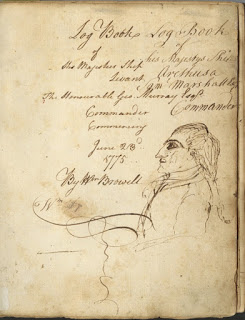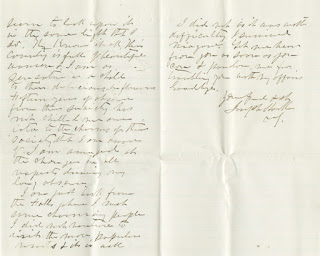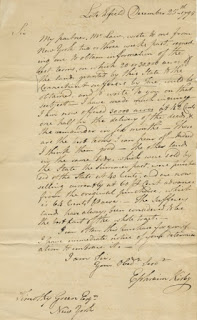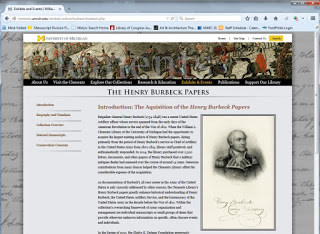Post by Cheney Schopieray, Curator of Manuscripts
Graduate students are a vital part of the William L. Clements Library. As work-study employees, interns, grant-funded workers, and volunteers, graduate students help the Library with many different sorts of jobs and projects. They create inventories and indices, conduct research, arrange and describe collections, copy materials for patrons, perform office tasks, and work on special projects. Students benefit from mentorship by the Library’s curatorial staff and the opportunity to gain hands-on, practical experience in a premier library of early Americana.
One type of project often assigned to graduate students is the creation of finding aids, documents that provide researchers with information about collections of archival materials. As part of the process, students are able to expand and apply their knowledge of descriptive standards for archival materials. They either gain an introduction to or additional experience with the creation and revision of XML-formatted documents and the creation/revision of machine-readable cataloging (MARC) records.
The following examples highlight finding aids for new or previously uncataloged collections, created by graduate students at the William L. Clements Library.
Finding Aid: Green-Mitchell Family Papers, bulk 1780-1812, 1831-1862. This collection complements the Library’s fine collection of school papers of Rhode Island College (now Brown University) students Timothy and William Green (finding aid: Timothy and William Green Papers, David P. Harris Collection, 1784-1798).
In the winter semester of 2015, UM School of Information student Hannah Brookhart arranged, described, and completed a finding aid and supplementary index for the Green-Mitchell Family Papers (acquired 2013). This collection of over 1,500 letters and documents reflects the activities of the Green and Mitchell families of Massachusetts and New York. Of particular importance are approximately 400 letters to New York lawyer Timothy Green between 1780 and 1812, respecting the mercantile and land speculation activities of his brothers and business partners in South Carolina, New York, Massachusetts, Jamaica, and the Western United States.
___________
Finding Aid: Henry Burbeck Papers, 1775-1866.
Online Exhibit: The Henry Burbeck Papers.
The Clements Library received a generous grant from the Gladys K. Delmas Foundation to hire a project archivist for the processing of the Library’s Henry Burbeck Papers (acquired 2014). Brigadier General Henry Burbeck was a career artillery officer in the United States Army (1775-1784, 1786-1815), serving as Chief of Artillery from 1802 to 1815. The Library hired UM School of Information student Louis “Louie” Miller to arrange, describe, and create a finding aid and supplementary indices for the collection. Louie also worked with the Curator of Manuscripts to create a mini online exhibit to further advertise the acquisition of the collection: The Henry Burbeck Papers.
Finding Aid: HMS Levant and HMS Arethusa Log Book, 1775-1777.
As a summer intern, Wayne State University School of Library and Information Science student Nicole Sobota wrote finding aids for three of the library’s “small collections” – important groups of manuscripts not belonging to larger bodies of papers. Nicole described a recently donated volume, containing the logs of two British ships operating in the English Channel and the Mediterranean during the American Revolution: the frigates HMS Levant and HMS Arethusa.
 |
| Figure 2: Title page of the HMS Levant and HMS Arethusa Log Book. |
Finding Aid: Joseph Hooker Collection, James S. Schoff Civil War Collection, 1862-1865.
The Civil War collections of the Clements Library continue to expand. However, many of the important donations of James S. Schoff in the 1970s – particularly “artificial collections” of miscellaneous individual letters and documents – require new and more detailed descriptions. Nicole Sobota wrote an item-level description of the 22 letters of the Joseph Hooker Collection, touching on Hooker’s involvement in the Peninsula Campaign and the Western Theater, his leave from the army in Watertown, New York (September 1864), and his administrative duties in Cincinnati, Ohio (1864-1865).
 |
| Figure 3: Joseph Hooker ALS to B. N. Stevens; September 1, 1864, pp. 6-7. |
Finding Aid: Perkinsville (Vt.) School District Documents, 1818-1851.
While the Clements Library is recognized for its exceptional and magnificent collections of prominent individuals’ papers, it continually acquires important groups of materials related to the lives of lesser-known and unknown persons and institutions. In 2013, the Library acquired 46 receipts, committee meeting reports, meeting requests, and tax documents related to the operation of the 1st school district in the village of Perkinsville, Vermont. These manuscripts provide a detailed view of issues associated with running a district school in a mill town in the early 19th century. They reveal information about teachers’ wages and local townspersons’ coverage of the costs of firewood, boarding for educators, furniture construction, necessary supplies, maintenance, and other expenditures. The collection joins the Library’s many holdings related to education in the early decades of the United States.


